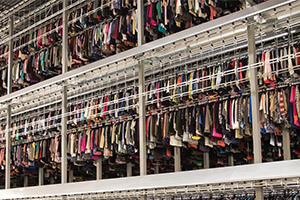
Goverment lets the fashion industry to thrash our planet
YarnsandFibers News Bureau 2019-06-25 14:55:00 –The proposals from Parliament’s Environmental Audit Committee to begin to address the thoroughly outsized contribution of the fashion industry to the trashing of our planet were modest.
If they could be criticised, it was for that very modesty.
They started with the proposal for 1p per garment to be taken as a levy, raising £35 million a year to fund better collection and sorting of garments to stop them ending up in landfill.
There was also a call for a ban on incinerating or landfilling unsold clothes that could be used – you might call it the Burberry measure, after the luxury brand was exposed as doing just that to keep up the value of its products, an insult to the workers who laboured on them, the planet, and the people they claim would “devalue their brand” if they could afford to wear them. After pressure, it declared it would stop.
Mandatory environmental targets were also proposed for major fashion retailers – the ones who are pushing down the throats of consumers mass quantities of low-quality, short-life garments. The volume of garments being sold in the UK having doubled in the last 10 years – and it is not as though there was a clothing shortage in 2009.
Given the environmental impact of the “fast fashion “ sector, and its clear lack of contribution to human health and wellbeing, these are very small scale indeed.
Yet the answer from the government was no, no and no again.
Some of the responses seemed to be more from the era of David Cameron than Theresa May – the claim that environmental targets could be left to voluntary action from the retailers, despite the fact that only 11 have signed up to the Sustainable Clothing Action Plan (SCAP). (And Wrap, the charity that runs it, has lost most of its government funding, one more austerity.)
Others were distinctly from the Defra era of Michael Gove (he of the endless consultation on a bottle deposit scheme of the kind long established in much of the rest of Europe). The suggestion from the government was that the 1p charge might be considered by 2025. Really, does anyone believe this government will be in power then?
The government said outlets had to be found for waste textiles, rather than banning their destruction, without any idea of how that could be done.
Standing up to the fast fashion industry
How about, radical suggestion, not producing them in the first place?
How about insisting that clothing be produced to a standard that lasts, rather than turning to rags after a couple of washes.
We are in a climate emergency. Our natural environment, hammered by pesticides and intensive farming, is in crisis. Our rivers and oceans have been turned into plastic soup (60% of fabric produced in the world is artificial, in other words plastic – and it sheds fibres even before it becomes a rag).
We cannot afford “fast fashion”. We do not benefit from it.
The workers (mostly women) who produce it suffer abysmal conditions and all too often direct abuse.
The rightwing newspapers like to blame individual consumers for fueling demand, but of course their choices are constrained hugely – by poverty (if you’ve got a job interview on Monday and need a new shirt and only have £5 in your pocket, you’ll buy the £5 one, even if you know it won’t last past next week), by endless hammering of the message that your miserable, stress-filled life can be transformed by a product advertised in a perfect picture of an airbrushed model on a sunny beach, by lack of information about the real impact of what is being bought.
Culture is changing fast. Upcycled, recycled (what used to be called secondhand) clothing is a bigger and bigger part of life, particularly for younger people.
But one of the things that demands is that clothing is made to last long enough to make it viable, something the charities who do much of this work say is increasingly not the case.
Like so many other aspects of our society, the fashion industry is broken. And it will take collective – government – action to fix it, a government acting for the benefit of the many, not for the profits of the multinationals.
Courtesy: Bright Green
Market Intelligence
Ask for free sample Report

experience
Customer Base
dedicated team
Countries Served Worldwide









